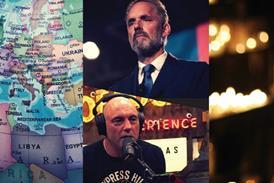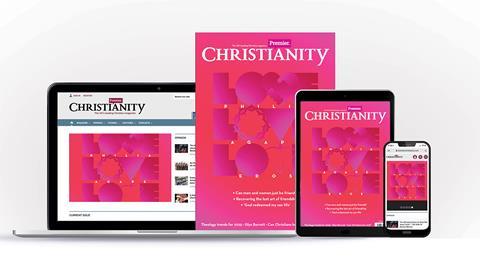In a wide-ranging interview with John Buckeridge, Michael Nazir-Ali, the Anglican Bishop of Rochester encourages Christians in general, and evangelicals in particular, to be more confident about witnessing, debating theology, defending Christian ideals and loving people – whoever they may be. JB: If you were a doctor and the Church of England was your patient what would you say the state of its health is?
MN: I think I would prescribe regular exercise and ask the patient to be watchful as far as diet is concerned.
So you’re broadly positive, even though according to some people the C of E is sickly?
I hope I’m not complacent. I think there is a lot of strength there particularly in churches from an evangelical and charismatic background – some of which are growing. In 2005 our diocese as a whole grew in a modest way. Confirmation numbers, which are some kind of yardstick, also grew quite significantly by about 20 per cent, so there are good signs around, but we have to be careful and faithful.
If that trend continues, you might imagine that in 30 years’ time, the bishops of the Anglican church will mostly be evangelical and/or charismatic. Is that a safe assumption to make?
I’m not sure that it is. I don’t think that the strength of the evangelicals [on the ground] is reflected on the bench of bishops or in other parts of the church. Many evangelical churches are not particularly keen to operate at a national church level. They are very busy making disciples, growing churches and they haven’t got the time really for these other things. And I can see why they think like that. Then, in the Church, there is the culture of the balancing act – there are also the interests of the state that have to be taken into account. As I say, at the moment the strength of the evangelical constituency is not reflected in the national structure of the church.
How can that be addressed – should evangelical Anglican churches take more interest in synod, in bishops, in putting forward evangelicals for key positions of leadership and influence?
I think that’s one aspect – the other is that the national church should take more interest in evangelicals. Rather than being afraid of them, their mission and ministry should be affirmed.What impact has the mission shaped church initiative, which calls on the Church of England to be creative and culturally relevant in its evangelism, had?
We need mission-shaped thinking, a lot of the obstacles to the good news of Jesus Christ in our culture are not particularly to do with how Christians meet and where they meet and so forth. I think we need to be more vigorous in our apologetic to give an account of the good news – to show people how the good news of Jesus relates to daily living. To the issues that they face in their nation or local community, that involves a pretty fundamental rethink in terms of where we are today so mission thinking, mission-hearted and mission-shaped – all those things are necessary and they need to go together.
What mission-shaped initiatives in your local diocese excite you?
The Thames Gateway is a huge swathe of housing and industrial development that the church has to contribute to so that these communities have a heart and a soul, and also a Christian presence. There is a very vigorous chaplaincy work going on in Bluewater, which is at the heart of the gateway. That has come into existence through a mixture of diocesan, ecumenical and local initiatives. Next to one Church school we have a Christian general practice, while the church meets in the school – so you’ve got a new reality already. We are concerned that churches in the gateway are preparing the local inhabitants to benefit from the new developments, because we don’t want another Docklands, where the locals were shut out by what was going on around them. We could do with lots more resources, but we have seen some success, especially in developing community-oriented church buildings.
What other things make you optimistic for the future?
People generally are more sensitive to spiritual reality, they are not content with a purely material existence, they know that their significance as a person transcends this consumerist context in which they live. At times of need they very often want spiritual comfort and counsel. These must be matters of hope for the Christian gospel because the gospel can answer some of the questions that people have.
This is a fantastic opportunity, but some would say there are big threats too. Someone I know is married to a curate in a city centre parish, who often chooses not to wear his dog collar because he so often gets verbally abused by strangers who spot the collar.
That should be a matter of joy for him because Jesus also was abused.
But doesn’t that indicate that while many people are interested and open to spirituality, they have a negative view of the established church?
I’ve not had the experience your friend has had. My experience is that the dog collar or some sign of being a Christian minister actually opens doors generally. For instance if you’re wearing a dog collar you can talk to almost anyone of any age – but I think it is true that while people are open to the spiritual, they regard institutionalised religion with suspicion. And that is not just restricted to institutional religion but to institutions generally.
Recently you spoke at an event organised by Premier Radio called ‘Faith Under Fire’. You spoke about a new climate of hostility among some parts of the media about things with a Christian tag.
While people have been disowning the Christian heritage of this nation they haven’t been able to put anything in its place – they tried Marxism and that failed so the options now are between acknowledging the Christian background to a lot of this country’s values, institutions, laws and customs, or having a vacuum. Having a spiritual vacuum in this country is very dangerous, because the problem with having a vacuum is that something fills it, and there are all sorts of things that can fill it that would be highly dangerous.
How can Christians therefore stand up for what they believe is true and right without coming across as negative, intolerant or homophobic?
I think the key is to show people that what we are commending is not personal prejudice but something that God has revealed for the good of humanity. It could be to their personal good, their families’ good, the common good, and in my work in the public sphere that is what I try to do – you don’t come at things in an arbitrary way, but because they have been shown to be good for people.
So how can we communicate in a positive way, hold to our understanding of biblical truths, and yet speak up for what’s being eroded, for example on the gay issue?
The first thing is, we have to love people, whoever they may be, and show them our love. We have to show them that we are willing and able to welcome them into our homes, our churches, and our lives. I don’t begin with negatives, I begin with positives – what is God’s purpose for human beings, which has been shown from the very beginning through the Bible, and then right through the teaching of the church, which is the good of marriage and the family. God has created human beings, they’ve been created together, they’ve been given a common mission in their stewardship of the world, and they are the same but also different. It’s not as if it is men are from Mars, women are from Venus. They’re not two completely different species. They are both made in God’s image, both given a common mission, but also the differences between them make for a complementary, stable and permanent relationship for bringing up children.
All of this has been obvious to previous generations and we can see how important it is for society. It is important for children to be brought up with both parents, this is not to say that there aren’t single parents heroically bringing up children. But it is good for society, for children to have a father and a mother available to them, so they can relate to them in different ways for the wholeness of their nurture and growth.
You say let’s begin with the positive – let’s be welcoming, show people love. So how can Christians protest about issues like the Sexual Orientation Regulations (SORs) and still come across as positive and loving?
The debate about the SORs is not about the welcome for and justice for people who identify themselves as gay or lesbian, it’s about what activity maybe appropriate, for example on church premises, or in the homes and facilities owned by Christians. Obviously many Christians are going to say that is determined by what the Bible and what the church teaches, about the proper place for sexual expression generally, not just for Christians but for society as a whole. Gay and lesbian people should have access to all the facilities anyone else does. The question for Christians isn’t that of persons having access, but of activity taking place on their premises, whether it’s church premises or private premises, that are contrary to what Christians believe. Most Christians believe that the proper place for sexual activity is marriage, so anything else is clearly contrary to what they believe, it also had to do with teaching about marriage and family – in schools for example. Also having respect for conscience, so that people should not be compelled to do what is against their conscience, for example on issues of adoption and fostering.
The primates of the Anglican church met in Tanzania recently. Many predicted that the church would finally split here over the gay issue. Are you pleased that schism has been averted? Or is the Church of England like a married couple with irreconcilable differences? To avoid having further rows and seeming fixated about the gay issue, should it divorce and let the liberal wing go its own way?
I think it’s the media that is fixated on this issue. The reason some people think the church is obsessed with sex is because the media only report on church debates when we talk about sex. General synod for example debates all sorts of important things, which are never reported on. However, yes, I think in a modest sort of way, the primates have given a direction. But it also has to be said that the divisions are very deep – not just on this [gay] issue alone – they have to do with the doctrine of God, they have to do with what people believe about Jesus, they have to do with the uniqueness of Christ and of salvation. These divisions are not just superficial. In the end there are two sorts of world views people have, and this is just not restricted to the Anglican church, this is a division within the Christian world and it goes back a long way. How long people can continue to live under the same roof has to do with charity, to do with learning with one another, but also to do with not compromising on fundamentals.
Recently a group of evangelical Anglicans signed a covenant calling for alternative orthodox oversight in a situation where the bishop is liberal. Did you sign up?
I’ve not signed it, but I understand where the authors are coming from. That does not mean I endorse all the language that’s in it or even the ideas. It goes back to this basic division that there is within the church. I think that we will have to, in due course, provide for appropriate oversight for people who feel very uncomfortable with some of the beliefs and practices of some church leaders.
Another big issue for the Anglican church is its relationship with Islam. You were brought up in a Muslim family background in Pakistan, which gives you particular insights to offer us all. You have also written widely about Christian-Muslim dialogue. What is the church doing and what more should it do to share our faith in appropriate and sensitive ways with our Muslim neighbours here in the UK?
I think the churches have been very good in hospitality ministry, in welcoming people, in listening, and making facilities available to Muslims and other people. What we’ve not been so good at in this country is embassy ministry. We are sent out with the good news. Partly it’s a matter of confidence, some of it has been a matter of sensitivity. But my approach to my Muslim friends and relatives has always been that I fully understand that Islam is a missionary faith and I fully expect them to invite me to consider the claims of Islam. What I say is that the Christian faith is also a missionary faith; while I’m very happy to listen to what they say, my task, as a Christian, is to commend Jesus Christ to them in ways that are sensitive and appropriate. And I personally have found that when Christians and Muslims together realise that each is a missionary faith, some of the tension is released and people can be more relaxed with one another, because they know that the other is not trying to fool them into something. Then you can cooperate on a whole number of issues, whether they’re local or global. And I try and do that at every level.
City centre churches have a particular role to play in this. Literature is also very important in witnessing among Muslims. One of the great difficulties of course, and I think one has to be frank about this, both nationally and internationally, is the question of freedom, that the freedoms we have in this country we also want for other people. Are those freedoms then accorded to Christians? So there is a question of reciprocity, I don’t mean tit for tat, although it can easily descend into that. But what I say to my friends and relatives is, ‘Let us be committed to a common set of values about freedom, for instance, and I will promote them where I have influence, and you will promote them where you have.’
What is the biggest opportunity that the church faces, and the biggest threat?
The biggest opportunity is the sensitivity among people to spiritual truth. The biggest threat is from the secularisers who want to marginalise all belief but have nothing else to put in its place.
---
This interview took place on 12 March, 2007.
John Buckeridge is the senior editor of Christianity magazine.



























